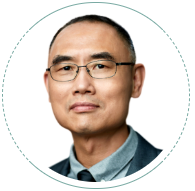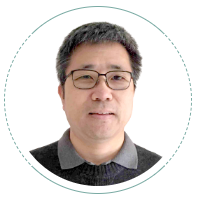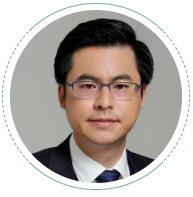
11月27日由中国人工智能学会和IEEE北京分会联合主办,西南交通大学、四川大学、CAAI智能服务专委会、CAAI会员服务工委会联合承办,四川省人工智能学会支持的2022年第八届IEEE云计算与智能系统国际会议(以下简称“CCIS 2022”)将在成都举办。本次会议共收到来自多个国家的280篇有效投稿,经过严格评审最终录用136篇,录用率为48.6%。所有录用论文将收录至会议论文集,并提交IEEE Xplore在线数据库检索,挑选出的优秀论文扩充内容后可推荐至检索期刊。
本次会议由CAAI名誉副理事长、日本工程院院士任福继教授,加拿大皇家科学院院士Witold Pedrycz教授,中国工程院外籍院士罗智泉教授,西南交通大学校长杨丹教授共同担任大会主席,西南交通大学计算机与人工智能学院党委书记李天瑞教授担任大会执行主席。会议将邀请来自海内外的知名专家学者围绕云计算、人工智能的前沿技术和热点问题进行深入研究和探讨,以促进相关技术和产业的发展。
CAAI名誉副理事长、加拿大工程院和加拿大皇家科学院两院院士、微众银行首席人工智能官杨强教授;ACM SIGKDD前主席、AAAI/ACM/IEEE会士、伊利诺伊大学芝加哥分校刘兵教授;美国医学与生物工程院院士、深圳理工大学(筹)计算机科学与控制工程学院院长潘毅教授;京东集团副总裁、京东数字科技首席数据科学家、京东城市总裁、西南交通大学人工智能研究院院长郑宇教授将受邀出席CCIS 2022作主旨报告。
嘉宾简介

杨强
Talk Title:
Trustworthy Federated Learning
Abstract:
Federated Learning is an important intersection of AI and privacy computing. How to make Federated Learning more safe, trustworthy and efficient is the focus of industry and academia in the future. In my lecture, I will systematically review the progress and challenges of Federated Learning, and look forward to several important development directions.
English Biography:
Qiang Yang’s research focuses on artificial intelligence. He is a Fellow of Canadian Academy of Engineering (CAE) and Royal Society of Canada (RSC), Chief Artificial Intelligence Officer of WeBank and Chair Professor of CSE Department of Hong Kong Univ. of Sci. and Tech. He is the Conference Chair of AAAI-21, President of Hong Kong Society of Artificial Intelligence and Robotics(HKSAIR) , the President of Investment Technology League (ITL) and Open Islands Privacy-Computing Open-source Community, and former President of IJCAI (2017-2019). He is a fellow of AAAI, ACM, IEEE and AAAS. His research interests include transfer learning and federated learning. He is the founding EiC of two journals: IEEE Transactions on Big Data and ACM Transactions on Intelligent Systems and Technology. His latest books are Transfer Learning , Federated Learning , Privacy-preserving Computing and Practicing Federated Learning.

刘兵
Talk Title:
Theory and Algorithms for Open-World Continual Learning
Abstract:
Continual/lifelong learning learns a sequence of tasks incrementally. There are two popular settings, class incremental learning (CIL) and task incremental learning (TIL). A major challenge of continual learning is catastrophic forgetting (CF). While several techniques are available to overcome CF for TIL, CIL remains to be highly challenging due to an additional difficulty of inter-task class separation. Although numerous techniques have been proposed to solve the CIL problem, they are mainly empirical. In this talk, I will present a theoretical study on how to solve the CIL problem. The key result is that the necessary and sufficient conditions for good CIL performances are within-task prediction and task-id prediction or out-of-distribution (OOD) detection. Interestingly, this result naturally connects continual learning and open-world learning, which aims to learn continuously during deployment, detecting novelties or OOD samples and learning them to become more and more knowledgeable. Based on this theoretical result, new CIL methods are designed, which outperform strong baselines by a large margin.
English Biography:
Bing Liu is a distinguished professor at the University of Illinois Chicago. He received his Ph.D. in AI from University of Edinburgh. His current research interests include continual/lifelong learning, lifelong learning dialogue systems, open-world learning, and machine learning. His previous research interests include sentiment analysis, fake review detection, Web mining, and data mining. He has published extensively in prestigious conferences and journals and authored four books: one about lifelong/continual machine learning, two about sentiment analysis, and one about Web mining. Three of his papers have received Test-of-Time awards and another one received Test-of-Time honorable mention. Some of his works have been widely reported in popular and technology press internationally. He served as the Chair of ACM SIGKDD from.

潘毅
Talk Title:
Automatic and Semi-Automatic Translation for Cloud Programming Models
Abstract:
Cloud computing has gradually evolved into an infrastructural tool for many scientific and business applications with intensive data or computing requirements. One of the challenges in cloud computing now is how to run software efficiently on cloud platforms since lots of classic sequential codes are not ready to be executed in parallel in cloud environments, resulting in long execution time and low efficiency. It is also costly and labor intensive to redesign and convert current sequential codes into cloud codes running on cloud programming models such as MapReduce or Spark. Thus, automatic translation from sequential codes to cloud codes is one of the directions that could resolve the problem of slow code migration from traditional computing platforms to cloud infrastructures. In this talk, I will present several automatic translators (M2M, J2M and J2S) for cloud programming models MapReduce and Spark. I will provide details of the design of our translators and their performance results based on many experiments. Performance comparisons between hand coded cloud programs and automatically translated codes will also be carried out. Semi-automatic translation with human tuning will also be introduced. Our experimental results indicate that the translators we have designed not only can precisely translate the sequential codes such as MATLAB codes or Java codes into cloud codes, but also can achieve almost a linear speedup in performance if the data sizes in the applications are huge enough. Since cloud computing is used for big data anyway, this demonstrates that automatic translation to reduce labor costs is a possible effective way to go for cloud programming. In addition, the limitations and shortcomings of our automatic translation and semi-automatic translation will be identified and future directions in this area will be provided.
English Biography:
Dr. Yi Pan is currently a Chair Professor and the Dean of College of Computer Science and Control Engineering at Shenzhen Institue of Advanced Technology, Chinese Academy of Sciences, China and a Regents’ Professor Emeritus at Georgia State University, USA. He served as Chair of Computer Science Department at Georgia State University from 2005 to 2020. He has also served as an Interim Associate Dean and Chair of Biology Department during 2013-2017. Dr. Pan joined Georgia State University in 2000, was promoted to full professor in 2004, named a Distinguished University Professor in 2013 and designated a Regents' Professor (the highest recognition given to a faculty member by the University System of Georgia) in 2015.
Dr. Yi Pan is Fellow of American Institute for Medical and Biological Engineering,Foreign member of Ukrainian Academy of Engineering Science,Fellow of the Royal Society for Public Health,Fellow of the Institute of Engineering and Technology,and Fellow of the Japan Society for the Promotion of Science.
Dr. Pan received his B.Eng. and M.Eng. degrees in computer engineering from Tsinghua University, China, in 1982 and 1984, respectively, and his Ph.D. degree in computer science from the University of Pittsburgh, USA, in 1991.
Dr. Pan has published more than 450 papers including over 250 journal papers with more than 100 papers published in IEEE/ACM Transactions/Journals. In addition, he has edited/authored 43 books. His work has been cited more than 20000 times based on Google Scholar and his current h-index is 90. Dr. Pan is currently serving as Editor-in-Chief of Big Data Mining and Analytics (top 4% journal), Associate Editor-in-Chief of Journal of Computer Science and Technology (JCST), and Chinese Journal of Electronics (CJE). Dr. Pan has served as an editor-in-chief or editorial board member for 20 journals including 7 IEEE Transactions.

郑宇
Talk Title:
Urban Computing: Building Intelligent Cities Using AI and Big Data
Abstract:
Urban computing connects ubiquitous sensing technologies, advanced data management, analytics models, and novel visualization methods, to create win-win-win solutions that improve urban environment, life quality, and city operation systems. This talk presents the vision and framework of urban computing, introducing the challenges and the state-of-the-art solutions in each layer of the framework. Based on the vision of urban computing, we have built an intelligent city operation system which has been deployed in over 20 cities as a digital foundation to empower Big Data-driven applications, such as traffic/crowd flow predictions, air quality forecasting, and public resource allocations.
English Biography:
Dr. Yu Zheng is the Vice President of JD.COM and head JD Intelligent Cities Research. Before Joining JD.COM, he was a senior research manager at Microsoft Research. He was the Editor-in-Chief of ACM Transactions on Intelligent Systems and Technology from 2016 to 2021, and has served as the program co-chair of ICDE 2014 (Industrial Track), CIKM 2017 (Industrial Track) and IJCAI 2019 (industrial track). He is also a keynote speaker of AAAI 2019, KDD 2019 Plenary Keynote Panel and IJCAI 2019 Industrial Days. His monograph, entitled Urban Computing, has been used as the first text book in this field. In 2013, he was named one of the Top Innovators under 35 by MIT Technology Review (TR35) and featured by Time Magazine for his research on urban computing. Zheng was named an ACM Distinguished Scientist in 2016 and elevated to an IEEE Fellow in 2020 for his contributions to spatio-temporal data mining and urban computing.
- 党政机关科协
- 地方学会
- 兄弟学会
- 国际组织
- 常务理事单位
- 理事单位
- 会员服务
- 高校机构





